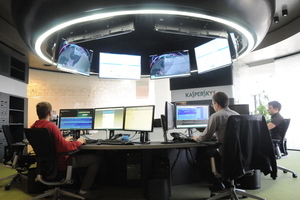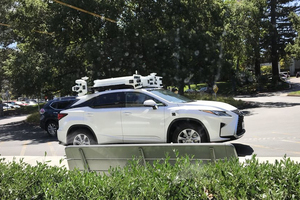Google’s new AI algorithm predicts heart disease by looking at your eyes
 Scientists from Google and its health-tech subsidiary Verily have discovered a new way to assess a person’s risk of heart disease using machine learning.
Scientists from Google and its health-tech subsidiary Verily have discovered a new way to assess a person’s risk of heart disease using machine learning.
By analyzing scans of the back of a patient’s eye, the company’s software is able to accurately deduce data, including an individual’s age, blood pressure, and whether or not they smoke. This can then be used to predict their risk of suffering a major cardiac event — such as a heart attack — with roughly the same accuracy as current leading methods. The algorithm potentially makes it quicker and easier for doctors to analyze a patient’s cardiovascular risk, as it doesn’t require a blood test.
Read moreYou think it and a robot sees it: The future is here with mind-reading AI
 The first “this could change everything” AI story of the year comes to us in the form of (yet another) AI that’s supposed to read minds. This time however, there’s no parlor trick. We’re one step closer to being able to broadcast our thoughts to a screen, thanks to artificial intelligence.
The first “this could change everything” AI story of the year comes to us in the form of (yet another) AI that’s supposed to read minds. This time however, there’s no parlor trick. We’re one step closer to being able to broadcast our thoughts to a screen, thanks to artificial intelligence.
Japanese scientists have created AI capable of reading a person’s brainwaves and displaying an image based on what they’re looking at. If a person is staring at a picture of the letter “A” the AI will successfully create an image that resembles a fuzzy version of that. It’s actually reading the person’s mind – sort of.
Read moreUber accused of using ex-CIA agents as spies
 A former Uber security manager says an espionage team inside the ride-hailing service used former CIA agents to help the company spy on its rivals overseas.
A former Uber security manager says an espionage team inside the ride-hailing service used former CIA agents to help the company spy on its rivals overseas.
The testimony in a San Francisco courtroom Tuesday comes amid revelations that federal prosecutors are investigating allegations that Uber deployed an espionage team to plunder trade secrets from its rivals. That has triggered a delay in a high-profile federal trial over whether the beleaguered ride-hailing service stole self-driving car technology from a Google spinoff. Uber’s manager of global intelligence said that Uber hired several contractors that employed former CIA agents
Read moreWikiLeaks says CIA impersonated Kaspersky Lab

In March, WikiLeaks began publishing documentation files describing what appeared to be CIA hacking tools as part of a leak dubbed Vault 7. Roughly two dozen tools and projects were disclosed over the course of several months. Now, after a two-month break, WikiLeaks announced a new round of leaks dubbed Vault 8, which provides source code and analysis for CIA tools. The organization pointed out that, similar to Vault 7, Vault 8 will not expose any zero-day or other vulnerabilities that could be used for malicious purposes.
Read more'It's able to create knowledge itself': Google unveils AI that learns on its own
 Google’s artificial intelligence group, DeepMind, has unveiled the latest incarnation of its Go-playing program, AlphaGo – an AI so powerful that it derived thousands of years of human knowledge of the game before inventing better moves of its own, all in the space of three days.
Google’s artificial intelligence group, DeepMind, has unveiled the latest incarnation of its Go-playing program, AlphaGo – an AI so powerful that it derived thousands of years of human knowledge of the game before inventing better moves of its own, all in the space of three days.
Named AlphaGo Zero, the AI program has been hailed as a major advance because it mastered the ancient Chinese board game from scratch, and with no human help beyond being told the rules. In games against the 2015 version, which famously beat Lee Sedol, the South Korean grandmaster, in the following year, AlphaGo Zero won 100 to 0. The feat marks a milestone on the road to general-purpose AIs.
Read moreHere’s a closer look at Apple’s secret self-driving car
 A new video of what would appear to be one of Apple’s “Project Titan” self-driving cars was posted to Twitter last night, and it looks much different than it did the last time we saw it. The car appears to be outfitted with standard third-party sensors and hardware, including (count ‘em) six Velodyne-made LIDAR sensors, several radar units, and a number of cameras — all encased in Apple-esque white plastic.
A new video of what would appear to be one of Apple’s “Project Titan” self-driving cars was posted to Twitter last night, and it looks much different than it did the last time we saw it. The car appears to be outfitted with standard third-party sensors and hardware, including (count ‘em) six Velodyne-made LIDAR sensors, several radar units, and a number of cameras — all encased in Apple-esque white plastic.
The video was captured by someone who knows his stuff about autonomous vehicles: MacCallister Higgins, co-founder of self-driving startup Voyage (that just launched its own pilot ride-hailing project in a San Jose retirement community).
Read moreSkynet in China: Real-life 'Person of Interest' spying in real time
 If you’ve seen the TV series "Person of Interest," then you might recall that during the opening narration from Season One, Harold Finch would say, “You are being watched. The government has a secret system, a machine that spies on you every hour of every day. I know because I built it. I designed the machine to detect acts of terror but it sees everything.”
If you’ve seen the TV series "Person of Interest," then you might recall that during the opening narration from Season One, Harold Finch would say, “You are being watched. The government has a secret system, a machine that spies on you every hour of every day. I know because I built it. I designed the machine to detect acts of terror but it sees everything.”
I was reminded of that when I saw a GIF that appears as if it could be a Chinese version of the show. It is a CCTV clip showing current surveillance in China. Thanks to artificial intelligence, China’s sadly named “Sky Net” system demonstrates just how creepy real-time surveillance can be.
Read moreArtificial intelligence just made guessing your password easier
 Last week, the credit reporting agency Equifax announced that malicious hackers had leaked the personal information of 143 million people in their system. That’s reason for concern, of course, but if a hacker wants to access your online data by simply guessing your password, you’re probably toast in less than an hour.
Last week, the credit reporting agency Equifax announced that malicious hackers had leaked the personal information of 143 million people in their system. That’s reason for concern, of course, but if a hacker wants to access your online data by simply guessing your password, you’re probably toast in less than an hour.
Now, there’s more bad news: Scientists have harnessed the power of artificial intelligence to create a program that, combined with existing tools, figured more than a quarter of the passwords from a set of more than 43 million LinkedIn profiles. Yet the researchers say the technology may also be used to beat baddies at their own game.
Read moreThis AI program can make 3D face models from a selfie
 A group of AI experts from The University of Nottingham and Kingston University managed to create a new method by which two-dimensional images of faces can be converted into 3D using machine learning.
A group of AI experts from The University of Nottingham and Kingston University managed to create a new method by which two-dimensional images of faces can be converted into 3D using machine learning.
The researchers trained a convolutional neural-network to perform the task by feeding it tons of data on people’s faces. From there it figured out how to guess what a new face looks like from an previously unseen pic, including parts that it can’t see in the photograph. The 3D computer vision project really has to be seen to be believed, and you can try it out in a nifty demo here. The website doesn’t really do the full technology justice, but it’s bloody cool.
Read moreCIA developing AI that could track your social media posts to gather intelligence
 The CIA is making use of several artificial intelligence programs that access, gather, and retrieve social media intelligence for the agency.
The CIA is making use of several artificial intelligence programs that access, gather, and retrieve social media intelligence for the agency.
In a statement reported by Futurism, Dawn Meyerriecks, the deputy director for technology development with the CIA said at the Intelligence and National Security Summit that the agency had over 137 AI projects as part of "In-Q-Tel" where a large portion of it is created through collaborations with Silicon Valley firms. With greater ability and power to analyse data, AI programs thus created have reportedly taken to social media platforms and "comb through" all public records –all the stuff that is posted by people using social media.
Read moreAxarhöfði 14,
110 Reykjavik, Iceland















